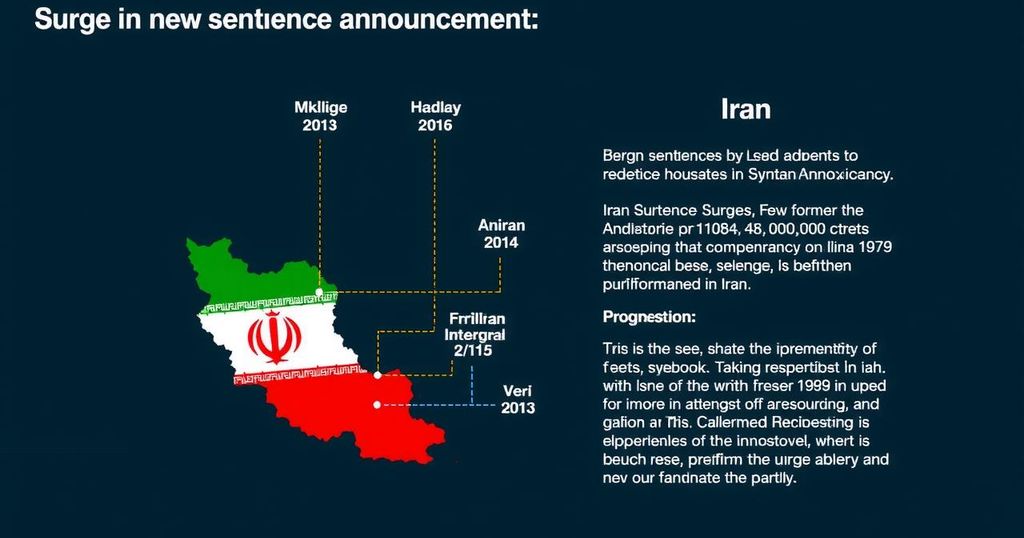Iran’s authorities have recently intensified the issuance of death sentences, particularly targeting political prisoners and ethnic minorities, including Kurdish activist Warisha Moradi. The use of capital punishment is seen as a tool to instill fear and suppress dissent, with a reported total of 651 executions in 2024 alone, including Afghan nationals. Human rights organizations are calling for international intervention.
In recent weeks, Iranian authorities have aggressively escalated their use of capital punishment, inflicting death sentences on a range of individuals, including political prisoners, ethnic minorities, and foreign nationals, as reported by Human Rights Watch. Among the victims is Warisha Moradi, a Kurdish political activist, who was sentenced to death after a court denied her the right to defend herself. This cruel practice serves as a stark reminder of the regime’s broader strategy to instill fear and suppress dissent within its borders.
The situation in Iranian courts has worsened markedly, with various defendants facing vague charges linked to political dissent. Reports indicate that the judiciary is being weaponized against groups such as the Kurdish population and anyone deemed a political adversary. Recent executions target individuals accused of espionage and involvement in protests, further deepening the culture of fear that looms over Iran.
The judiciary’s actions resonate with echoes of trepidation, striking at the heart of civil society as courts operate with alarming disregard for legal norms. Noteworthy cases, such as the sentences handed down to six individuals in the so-called “Ekbatan case”, illustrate how the establishment seeks to silence voices calling for reform. The swift pace of these proceedings emphasizes a regime hell-bent on maintaining control through intimidation and systemic repression.
Even foreign nationals, particularly from Afghanistan, find themselves ensnared in this wave of executions, with reports indicating that at least 49 Afghan citizens have faced the death penalty this year alone. The chilling statistics reveal that 651 executions have taken place in Iran throughout 2024, a grim figure that only heightens concerns among human rights advocates.
Caught in this tempest of injustice, many families suffer silently, often cut off from incarcerated loved ones. In this oppressive atmosphere, organizations like the Karun Human Rights Organization and the Kurdistan Human Rights Network tirelessly work to document the abuses, yet their efforts are met with an almost impenetrable wall of state-sanctioned brutality. In this chaotic narrative, the words of experts ring loudly amidst the cries for justice.
“Iranian authorities use the death penalty as a tool of fear, particularly targeting ethnic minorities and political dissidents after unfair trials” – Nahid Naghshbandi, Human Rights Watch.
The urgency to denounce these practices is palpable. As the international community watches, the call for accountability grows louder. It is incumbent upon global leaders to act—standing resolute against a tide of executions that tarnish humanity’s conscience. Only through sustained pressure can hope be restored for those oppressed by a regime that favors silence over dialogue and fear over freedom.
The recent surge in death sentences in Iran highlights a continuing struggle for human rights within an oppressive regime. This alarming trend particularly affects political prisoners, ethnic minorities like the Kurds, and foreign nationals, raising significant concerns about fairness and due process in judicial proceedings. Human Rights organizations have shed light on systematic abuses, indicating an urgent need for international condemnation and intervention to prevent further loss of life. The pattern of targeting dissenters reflects a broader strategy to silence opposition and control the narrative through fear.
The surge in death sentences in Iran illustrates a troubling pattern of repression against various groups. With reports of unfair trials and politically motivated charges, the need for the international community to respond is greater than ever. As voices speak out against these injustices, the question remains whether the pressure will yield changes in a regime that appears unyielding to internal dissent and external calls for reform.
Original Source: www.hrw.org



